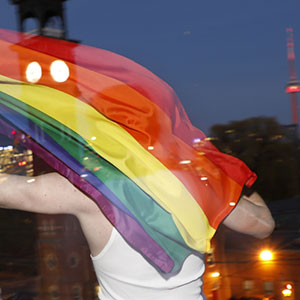- About
- Topics
- Picks
- Audio
- Story
- In-Depth
- Opinion
- News
- Donate
- Signup for our newsletterOur Editors' Best Picks.Send
Read, Debate: Engage.
| December 17, 2015 | |
|---|---|
| topic: | LGBT Rights |
| tags: | #Belarus, #homophobia, #LGBT |
| located: | Belarus |
| by: | Mikalai Anishchanka |
At the end of October Mikhail Pishcheuski, a 35-year-old homosexual was badly beaten in Minsk for his orientation. With 20 percent of his brain resected due to vast haematoma, he passed away after seventeen months later in hospital.
As Mikhail underwent through tough operations at the hospital, his attacker, former P.T. teacher Dmitry Lukashevich, was being tried. But the attempt of Mikhail's attorney to make the court aware of what had happened to be a hate crime didn't pay off. Lukashevich was convicted on hooliganism and causing bodily harm by negligence, sentenced to 2 years and 8 months in prison and was released on an amnesty in August 2015, after having served only an eleven months sentence and two months before his victim's death.
As the homophobic motives of the attack were clear, victim's attorney pleaded to court for considering the attack a hate crime: the Belarusian law reads it's a serious aggravating factor. The first plea of the kind in Belarus's juridical practice was, however, rejected.
Under the law of the post-Soviet republic, that abolished criminal prosecution of gays in 1994, only offences associated with racial, national and religious intolerance are qualified as hate crimes. As to LGBT bullying, there's still no legal precedent of such definition.
The apparent inconsistency in between - what Lukashevich committed and the penalty he paid - triggered a rush of indignation in Belarusian social networks. Surprisingly, pro-LGBT posts have received plenty of negative comments – even by democratically spirited users. “I'm ready to stand for Mikhail Pishcheusky's rights – because he was beaten, but not because he was gay”, was the keynote of such commentators.
Natalia Mankouskaya of the Belarusian human rights centre Identity - that advocates LGBT - suggests the degree of intolerance towards bi-, homosexuals and transgender in Belarus remains high. That, she says, can be explained from two perspectives. “In the former Soviet Union, homosexuality was spoken of either in criminal or in psychiatric discourse. In the 1990s, when information campaigns could have been held openly, activists failed to explain to society that a different sexual orientation was not a disease or crime. Up to date, the topic is concealed. The rusticity of the post-Soviet society is now overlaid with the interests of careless politicians. In search of inner and outer enemies to find an excuse for their own failures, they point at the LGBT community as well”.
She specifies she's speaking of Russia where, she claims, a wide-scale anti-LGBT campaign has been recently held by government organizations: adopting a bill banning what had been called 'homosexual propaganda' two years ago opened the floodgates to many hate speeches by state officials of different levels air by state-owned media. The current worsening of public sentiment to gays and lesbians in Belarus Mankouskaya blames on their negative image on Russian TV as Belarus is still widely incorporated in the neighboring country's media landscape.
“In Russian media, LGBT is frequently associated with paedophilia, which has triggered a new wave of homophobia. There have emerged numerous anti-gay groups in social networks, where Belarusians are also involved. Gay hunting broke out when gays are asked out on the web by those who want to beat them up”.
According to Mankouskaya hate crimes against LGBT are often not reported to the police as the victims mostly believe in the effectiveness because the offenders aren't expected to be punished, whilst the complainants themselves might become subject to indignities by the officers. “I regret to say, there are cases when the policemen insulted the affected known to be gays. Second, the fact that opening a criminal case when it comes to violence against gays are singular events proves appealing to the police is not effective”.
Identity has recorded five attacks against LGBT this year, in three cases the victims filed police reports, but only one criminal case was opened – just recently.
Mankouskaya believes this might have been predetermined by the public outcry caused by the case of Mikhail Pishcheuski.
So, his tragic death is followed by the hope that - unless hostility towards LGBT in the Belarusian society is cooled off - at least adequate punishment is applied when it ends up in crimes.
By copying the embed code below, you agree to adhere to our republishing guidelines.
